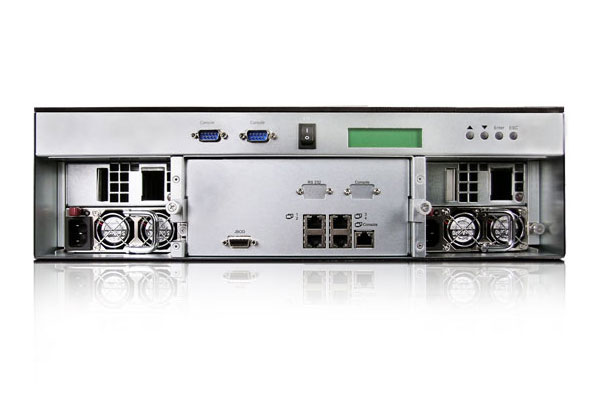Enhance Technology UltraStor RS16 IP-4 review
Enhance Technology's latest IP SAN appliance has value, expansion potential and performance high on its agenda. In this exclusive review Dave Mitchell finds out whether these make up for its basic hardware redundancy.
The UltraStor RS16 IP-4 provides a reasonable set of IP SAN storage features and we found it very easy to deploy. At this low price you won’t get dual controllers and redundant paths to expansion shelves, but it's still worth considering if you're looking for an IP SAN solution at a low price and willing to sacrifice features and redundancy to get it.

Enhance Technology has been in the network storage market for many years and its UltraStor appliances are aimed at SMBs looking for a low cost IP SAN solution. In this exclusive review we look at its RS16 IP-4 which combines a tempting price tag with a high capacity and impressive performance claims.
For this review we were supplied with a diskless appliance, but Enhance offers a system with a full house of 16 1TB Enterprise SATA 2 disks for 5,280. An 8TB version costs around 4,478 or you can choose one with 16 2TB SATA disks for 7,274. Enhance also supports 3TB Near-Line SAS disks.
The 3U chassis is well built with sixteen solid metal hot-swap carriers mounted vertically across the front and each incorporating disk status and activity LEDs. Power redundancy is handled by two 460W hot plug supplies at the rear and above these are hot-plug cooling fan modules as well.

The appliance's single RAID controller has four Gigabit Ethernet ports, dual power supplies and fans plus a mini-SAS expansion port.
The RAID controller is mounted in a metal sled which can be released and removed from the back once the appliance is shut down. It's equipped with a 1.2GHz Intel IOP 81342 dual core processor and 2GB of DDR2 cache memory, but it only supports 3Gbit/s SAS/SATA disks.
It's here that fault tolerant features end as the appliance doesn't support dual RAID controllers. There's no battery backup pack to protect the cache contents either, so we recommend a UPS which can be monitored using one of the serial ports at the back.
Expansion is good as the controller has an SFF8470 mini-SAS port which is used to daisy-chain up to four of Enhance's RS16 JS 3U disk shelves. This allows the array to be expanded to a total of 80 hard disks, although with only one port available you can't create redundant physical paths across the disk shelves.
Get the ITPro daily newsletter
Sign up today and you will receive a free copy of our Future Focus 2025 report - the leading guidance on AI, cybersecurity and other IT challenges as per 700+ senior executives
Dave is an IT consultant and freelance journalist specialising in hands-on reviews of computer networking products covering all market sectors from small businesses to enterprises. Founder of Binary Testing Ltd – the UK’s premier independent network testing laboratory - Dave has over 45 years of experience in the IT industry.
Dave has produced many thousands of in-depth business networking product reviews from his lab which have been reproduced globally. Writing for ITPro and its sister title, PC Pro, he covers all areas of business IT infrastructure, including servers, storage, network security, data protection, cloud, infrastructure and services.
-
 ‘Phishing kits are a force multiplier': Cheap cyber crime kits can be bought on the dark web for less than $25 – and experts warn it’s lowering the barrier of entry for amateur hackers
‘Phishing kits are a force multiplier': Cheap cyber crime kits can be bought on the dark web for less than $25 – and experts warn it’s lowering the barrier of entry for amateur hackersNews Research from NordVPN shows phishing kits are now widely available on the dark web and via messaging apps like Telegram, and are often selling for less than $25.
By Emma Woollacott Published
-
 Redis unveils new tools for developers working on AI applications
Redis unveils new tools for developers working on AI applicationsNews Redis has announced new tools aimed at making it easier for AI developers to build applications and optimize large language model (LLM) outputs.
By Ross Kelly Published
-
 Google layoffs continue with "hundreds" cut from Chrome, Android, and Pixel teams
Google layoffs continue with "hundreds" cut from Chrome, Android, and Pixel teamsNews The tech giant's efficiency drive enters a third year with devices teams the latest target
By Bobby Hellard Published